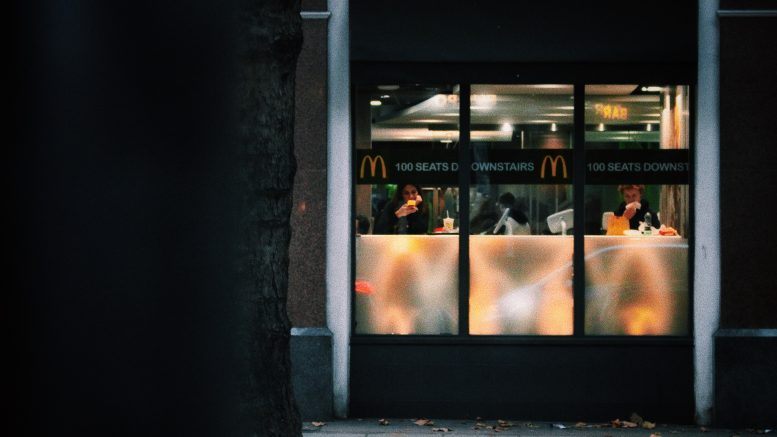Words: Kiera Chapman | Subbing: Joanne Clark
I’ll have my beats to go please, with a side order of chips.
It’s half past ten and I’m wedged between two human walls of sweat, crunching melodically side to side on crumpled plastic cups to the pulsating Supercut. It’s a song performed by the phenomenal Lorde; she’s playing out her London date of at Alexandra Palace and has been swanning euphorically around the stage for just over an hour now.
As far as headliner sets go, and judging by the prominence of Supercut on her 2017 album Melodrama, the performance indicates that the end of the night is nigh, but still a good twenty minutes away. I’m suddenly thrust forward into a space that has opened up beside me by a bunch of intoxicated White Teeth Teens. It appears people are already starting to leave. An attendee nonchalantly shrugs past, “I’m not too fussed – I’ve heard it all before. Let’s go home.”
I am shocked. Evidently, he is not waiting for that Green Light, nor does he want it.

Melodrama by Kiera Chapman
The live event industry is in it’s prime: UK Music’s study, Wish You Were Here, found that audience numbers had hit 30.9 million, up from 27.7 million in 2015, with 4 million people attending the ever-growing number of British music festivals in 2016.
Yet, it appears that our attitudes when it comes to going to gigs is changing. Whilst we’re more than happy to go, we also more than happy to limit our time there. In an image conscious world where being seen is outstandingly important, sometimes it’s enough to say that we’ve gone. If you can create enough content to satisfy an Instagram story and a VSCO filter, then you’re good to catch the last train home. This is a behavioural habit that is reminiscent of how we handle our food – we suit something instant and on the go; a quick fix so we are able to get on with our ‘lives’. Hence why another Shake Shack has weaved its way to Leicester Square.

Shake It, Baby by Kiera Chapman
Zac Mahrouche, 20, is a fashion and music photographer with an indulgent record collection and passion for live events. Yet even he notices a cultural shift in the way we view gigs and, as a victim of the internet age, is guilty of a few of these habits himself. “I usually arrive for my own convenience. There’s a general cultural shift to everything being immediate, influencing us to rush experiences. As a kid, I would want to see every single act even if I didn’t know their name.”
The variety of concerts to choose from doesn’t aid the shift in our attitude towards gigs – it doesn’t help that a large number of tickets ending up on resale sites at ridiculous prices. Singers such as Adele and Ed Sheeran have spoken publicly, expressing fruition with the evasive system – despite her best efforts, 2016 Adele tickets still managed to make their way online, with some being sold at a staggering £9,000 each.
As an artist manager for Ferocious Talent, Ben Bushell, 23, dedicates a large amount of time to gigs. Bushell strongly feels that the fleeting flocks of fake fans are predominantly down to the way tickets are distributed and resold.
Would he ever personally re-sell a ticket? “I would offer the tickets to my friends. I can’t stand people selling them online secondhand.”
He also highlights a major problem with corporate companies – how they’re being given handfuls of great tickets and using them as business perks with free drinks. “They are sending middle aged businessmen to gigs where they have no idea who the act, and then talk all the way through the set. Its a pain.”
Alexandra Palace’s lights glide form an icy blue to a neon green indicate the end of the show. It’s nearing eleven and as Lorde leaves, so do I, carried by in a hustle free crowd.
At a gig, moments of silence are rare, but it seems that seeing through – let alone over staying – your welcome is even rarer.

